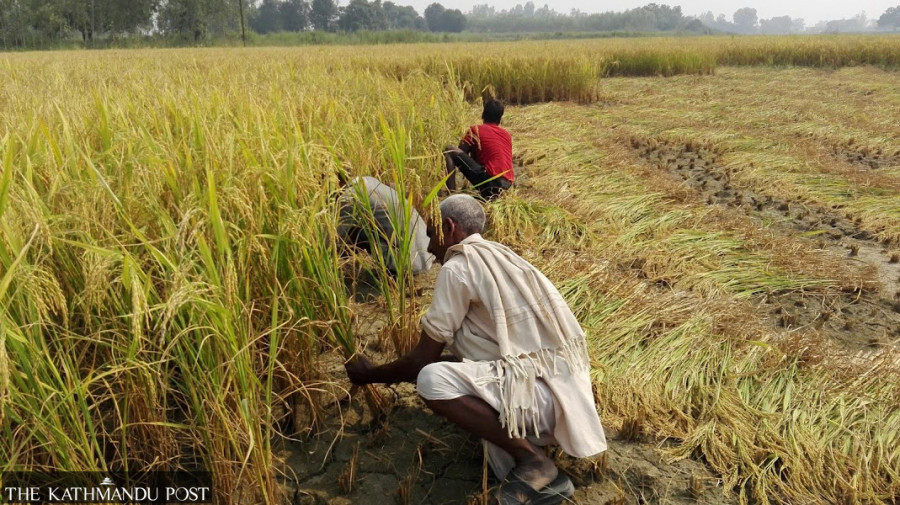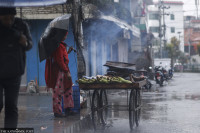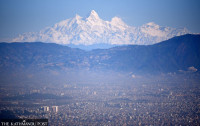Climate & Environment
Experts urge authorities to prepare for the worst of climate disasters
Amid IPCC’s ‘clarion call’, Nepal should be more proactive to adapt to climate crisis.
Arjun Poudel
Vegetables have become dearer of late. The price of groceries, including rice and wheat flour, has also increased exponentially. A prolonged dry spell for over five months affected the production of winter crops. And the subsequent rainfalls increased the risk of crops getting damaged ahead of harvesting. As a result, the price of daily essentials has seen a steep rise.
Of late, Nepal has been increasingly witnessing extreme weather events like prolonged drought and dry-spell during cultivation season, and flooding, landslides and inundation at the time of harvest. But the authorities concerned have yet to wake up to adopt measures to mitigate the impacts of such events, experts worry.
“Adverse weather events triggered by climate change have become more pronounced and more frequent of late,” said Madhukar Upadhya, a watershed expert who writes a column on environment and climate change for the Post. “Almost all the people in the country have been bearing the brunt of climate change directly or indirectly, but the authorities concerned have not yet woken up to address the problems.”
On Monday, scientists delivered a ‘final warning’ on the climate crisis. The Intergovernmental Panel on Climate Change (IPCC), composed of the world’s leading climate scientists, set out the final part of the sixth assessment report that stated that only swift and drastic action to curb greenhouse gas emissions can avert irrevocable damage to the world.
António Guterres, the United Nations secretary-general, has said the report is “a clarion call to massively fast-track climate efforts by every country and every sector and on every timeframe. Our world needs climate action on all fronts: everything, everywhere, all at once.”
The report states that damage to climate will become irreversible if global temperature rises to 1.5 degrees celsius above pre-industrial levels. To avert that, governments should drastically cut down on their emissions. If the governments just stick to their current policies, it would become impossible to limit global temperature to below 1.5 degree celsius, the report states.
Nepal is one of the most vulnerable countries to the climate crisis, as multiple studies have pointed out. Over the past few years, drought and dry spells have become the new normal in the cultivation season and floods and inundation in the harvesting season.
Last year, thousands of farmers throughout the country incurred heavy losses at the time of cultivation of summer crops. A prolonged dry spell in western Nepal in mid-monsoon forced farmers to migrate to India in search of work. Hundreds of people in districts of eastern Tarai were displaced due to floods and inundations. People in many parts of the country have been currently facing acute water scarcity due to prolonged dry spells.
Climate experts in Nepal agree that limiting global temperature to below 1.5 degrees celsius is not in the hands of the Nepal government. They say that even though the role of the country in the emission of greenhouse gases is negligible, people in the country cannot escape the brunt of the adverse effects of climate change.
“We do not need additional proof to say that climate change has had adverse effects on livelihoods in Nepal, as incidents of droughts, dry spells, landslides, flooding and inundation have become more frequent and thousands of people have been affected every year,” Upadhya said. “We need immediate actions to protect our people from the direct and indirect impacts of climate change but authorities concerned are too slow to recognise the problems and take measures accordingly.”
Farmers preparing to harvest winter crops—such as wheat, barley, oats, lentils and oilseeds—have been worried as rainfall has occurred daily for the last few days. Officials at the Ministry of Agriculture and Livestock Development concede that the rain has caused damage to winter crops but they do not know the scale of loss incurred by the farmers.
Sunil Kumar Singh, an information officer at the Department of Agriculture, said his office is currently assessing the rainfall’s impact on winter crops.
Lack of rainfall in the hilly and mountainous areas not only affected the production of winter crops but also hit power generation.
Mingma Chhiri Sherpa, chairman of Khumbu Pasang Lhamu Rural Municipality in Solukhumbu district, said that the local unit saw no snowfall in the entire winter months. “This affected the generation of energy from micro hydro in our areas,” he said. “Agriculture products, animal husbandry and tourism, which are a major source of income of our area, got affected due to lack of snowfall.”
Experts say that instead of doing something concrete, authorities concerned have been harping on about the same ‘trivial things’ such as lessening the use of plastic bottles, reducing smoke from industries, and promoting afforestation. They warn that the impact of global warming will be both short-term and long-term across multiple sectors.
Raju Pandit Chhetri, director of Prakriti Resources Centre, which advocates environment-friendly policies and development practices, said that it is important to consider what measures we take to provide scientific information about weather patterns to the public, how scientific and accurate our information is, and what we do in the aftermath of disasters triggered by climate, among other things.
“Implications of climate change will be in multiple sectors—health, food security, education and women empowerment,” he said.
Experts suggest other mitigation measures such as strengthening early warning and weather monitoring systems, encouraging farmers to opt for drought and flood-resistant crops or other alternatives to food crops, and launching crop insurance drives.
“All state agencies should collaborate and coordinate to deal with effects of climate change,” said Chhetri. “If we wait until extreme weather events become more frequent to react, it will be too late.”




 20.9°C Kathmandu
20.9°C Kathmandu











